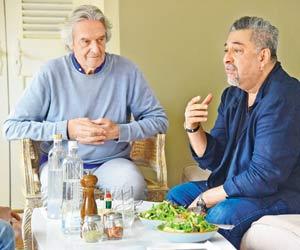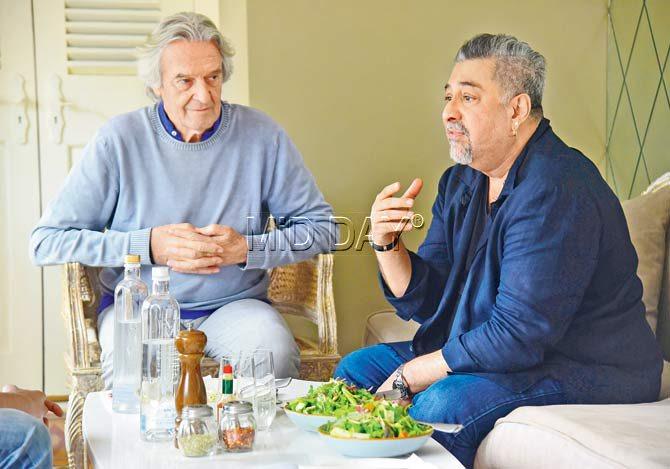John McLaughlin chats freely with Ranjit Barot about, among other things, how his life changed when he gave up using psychotropic drugs and turned vegetarian


John McLaughlin (left) meets Ranjit Barot over lunch at Café at The Quarter. Pics/Atul Kamble
A long-distance flight that landed early in the morning, a lengthy check through customs, and four email interviews and a telephonic one later, John McLaughlin walks in with Ranjit Barot for lunch at a café in Girgaum. The former is a guitar legend while the latter is a virtuoso drummer, and the two of them first met in 2006 at the Abbaji Festival, organised in Mumbai every year in memory of tabla maestro Ustad Alla Rakha Khan. There, McLaughlin was so taken in by Barot's western drumming that he later roped him in as a member of John McLaughlin and the Fourth Dimension, his latest project. And ever since, the two have forged a musical relationship that thrives on the symbiosis between the Englishman's deep-rooted India connection and Barot's unabashed western sensibilities. Here, they settle down for a chat that delves into what the term "fusion" actually means, the benefits of being vegetarian, and the use of psychotropic substances.
ADVERTISEMENT

Shunashir (to John): How did you transition from your rock 'n' roll lifestyle in the '60s?
John: Rock 'n' roll lifestyle? You mean a hippie. I was a hippie, and I'm still a hippie. Ranjit: We all were, and I don't think you stop being one.
John: Being a hippie is a philosophy. It's "make love, not war". But of course, the '60s were not at all like it is today. I grew up with musicians who were dropping LSD, myself included. But whereas there is such a negative view of these substances - and I am not talking about the addictive drugs, but about things like magic mushrooms, peyote and LSD - these have absolutely nothing to do with addiction. And after taking them for a couple of years, I got the answer - I have to change my life. That is when I became vegetarian, and started practising yoga and meditation in your country. And that's also when I got introduced to Indian philosophy and music, because my heroes are not only western. I had the great fortune to study the South Indian veena with Dr Ramanathan in the early 1970s, and then a couple of years later, the great Pandit Ravi Shankar taught me Indian music theory, both from the north and south. So, I am very lucky.

Shunashir: And is that what led you to play what we call fusion music?
John: No. All my western and Indian influences came together not because I was trying to make fusion music. The term "fusion music" came years later, as a marketing device for record companies. It's like, "Do you want a cheese burger or do you want a bacon burger?"
Ranjit: They came up with it because of being unable to describe a phenomenon that involves many musical worlds coming together. Firstly, fusion or whatever you want to call it has to exist inside of you as a collision of more than one world. So, of course, the record companies didn't know how to sell it, which is why they put it in a drawer. And actually, they were pushing it towards a lifestyle. It was music that you can smoke to, lounge music, music that you can drive to, you know?
John: And now it's music you can speak over. You go to these bistros that are playing music, and nobody is listening to it. They just talk louder. It's terrible. See, with fusion music, you have to ask yourself that with all the several different forms of music you have heard, do they all come together in your life? They will, if you love them, and if you are ready to work for them. Because for me to be able to play in the early '70s with great musicians such as Zakir Hussain, L Shankar and Hariprasad Chaurasia, I really had to work towards it, you know? You can't just walk into a culture and say, "Hey man, let's jam," to a person like Hariprasad Chaurasia. It's just disrespectful. You can't do that.
The food - Margherita pizza; farro wheat risotto with mushroom, leeks and Parmesan; burrata, vine tomatoes, dill pesto and fett unta salad; and tarragon roast chicken - arrives. Shunashir (to John): What made you turn vegetarian?
John: It's because I realised after reading about Indian philosophy, yoga and ways to holistic health that they all, without exception, recommend vegetarianism. And I grew up completely ignorant about any kind of concept of diet. I was born during WWII, and Britain was on its knees by the end of it. We ate just what we could, basically, to survive. For example, we had powdered eggs, and beef maybe twice a year, and chicken just once a year. So, the whole question of diet never even occurred to me until I came out of my whole psychedelic period, where I knew I had to change my life. And I knew that to alter my state of mind in a natural way requires another kind of discipline. So, I stopped everything, became vegetarian, and started practising yoga.
Ranjit: And you know, somebody had asked Sadhguru, who heads the Isha Foundation, the same question. He said, "Listen, when we grew up, there was
a cow tied to the barn to provide milk to the family. And when a baby was born in the house, the cow would lactate even more. It was emotionally connected to the family." So, he said, it's not about vegetarianism or non-vegetarianism. The more complex an organism that you consume is, the tougher it is for it to pass through your system, since it's an emotionally alive animal with ties to human beings and its own kind.
John: Yes, and particularly today, the meat is full of antibiotics and hormones. But, it's not that I go around propagating vegetarianism, not at all. It's just that it's my choice. That's all.
Download the new mid-day Android and iOS apps to get updates on all the latest and trending stories on the go
 Subscribe today by clicking the link and stay updated with the latest news!" Click here!
Subscribe today by clicking the link and stay updated with the latest news!" Click here!







